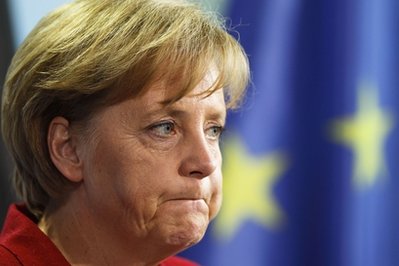Global General
Merkel: $29.6B in aid for Greece planned
(Agencies)
Updated: 2010-05-04 09:32
 |
Large Medium Small |
|
|
|
||||
The remark Monday was a nod to the popular discontent in Europe's biggest economy about having to pay so much to help a fellow European Union country that many Germans feel has been fast and loose with its finances for years.
The European Central Bank, meanwhile, suspended its rating limits on Greek debt.
Both moves came after European governments and the International Monetary Fund agreed Sunday to give euro110 billion ($145 billion) in loans to Greece over three years. The loans came after Athens adopted a new round of austerity measures that provoked fresh uproar among Greek workers.
IMF officials say Greece could start receiving money from the rescue package in about a week.
Germany would contribute euro8.4 billion ($11.1 billion) for the first year of the bailout this year, followed by euro14 billion ($18.5 billion) over 2011 and 2012, or 28 percent of the overall package. The money would come in the form of credit extended to Greece from KfW Development Bank, which is backed by the German government.
The draft law backed by the cabinet will be debated by both houses of parliament, and Merkel wants to have it approved before she heads to Brussels on Friday for an EU summit on Greece.
In a first step, the two caucuses of the governing coalition approved the legislation Monday with only a few lawmakers voting against the draft -- giving the strongest indication yet that the bill will be passed in time.
The coalition's majority would be sufficient to pass the law. The first round of voting is scheduled for Wednesday with the final two following on Friday.
Merkel's government had insisted on the latest Greek austerity package before it would move to free up aid. Her party faces a crucial regional election Sunday in North Rhine-Westphalia, Germany's most populous state, and many German voters are angry that their taxes are being used to bail out Greece while Germany itself struggled through years of budget-tightening to bolster its own economy. The election could affect the makeup of the upper house of Parliament and set the tone for future votes.
"This is just the tip of the iceberg and I am afraid of it," Werner Selmer told AP Television News at Berlin's main train station. "Is this necessary? Should we do this? I think yes, my feeling is yes, but I have a bad feeling, a very bad feeling."
In Rome, Italian Foreign Minister Franco Frattini criticized Berlin for the delay.
"The later you intervene, the worse it gets." Frattini said Monday, noting that the initial figure mentioned was "euro50 billion -- 10 days later we decided on euro110 billion."
France will contribute 20.7 percent of the total or euro16.8 billion over three years, at a fixed rate of 5 percent, French Finance Minister Christine Lagarde told Le Monde, saying the rate of interest is equivalent to the 3.75 percent variable rate charged by the IMF. The rate is above the 1.5 percent that France borrows at, a reflection of the risk, she said.











